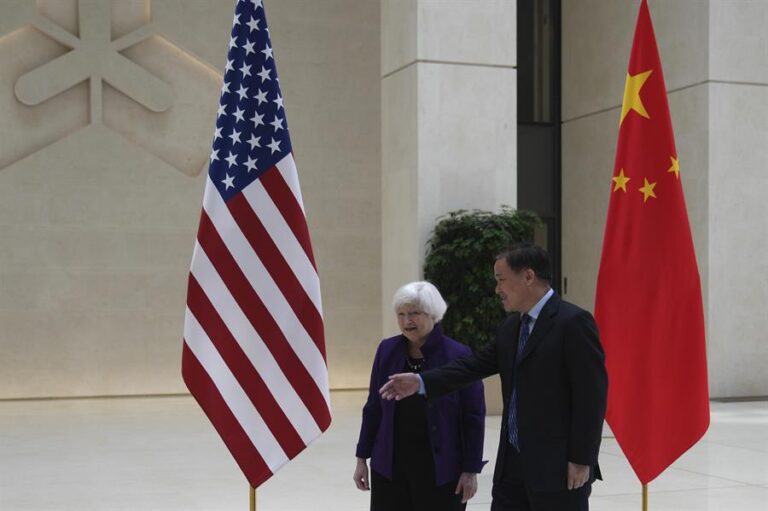
No Decoupling from China, says Yellen
Beijing, Apr 8 (EFE).-
The United States isn’t pursuing decoupling from China but rather advocates for the two major economies to handle their relationship responsibly, US Treasury Secretary Janet Yellen said on Monday in Beijing.
Before wrapping up her second visit to China in less than a year and returning home on Tuesday, Yellen stressed the importance of a robust economic relationship between China and the US.

However, she expressed concern about “Chinese macroeconomic imbalances,” including the industrial overcapacity, its “weak domestic consumption,” and “government support” for certain sectors.
“As the world’s two largest economies, we have a duty to our own countries and to the world to responsibly manage our complex relationship and to cooperate and show leadership on addressing pressing global challenges,” Yellen said.
Yellen warned that decoupling between the two powers would be “disastrous,” expressing satisfaction with the strengthening ties between compared to the previous year.
She said the ties improved due to intensified diplomacy and the establishment of economic and financial working groups, enabling substantial and in-depth discussions.
Highlighting three main areas of progress during her recent meetings with senior Chinese officials, Yellen mentioned the initiation of intensive exchanges on “balanced growth,” expansion of cooperation in combating illicit finances, and continuation of financial technical exchanges.

Regarding national security, Yellen reiterated the US commitment to prevent the flow of materials supporting Russia’s defense industrial base in its war against Ukraine.
She cautioned that companies, including those based in China, would face “significant consequences” and the risk of sanctions if they provided material support to Russia’s war against Ukraine.
Beijing has maintained an ambiguous stance towards the European conflict.
Yellen underscored the importance of a clear definition of “national security” in the economic sphere.
She urged Beijing to clarify the distinction between economic affairs and national security amid growing unease among foreign companies in China regarding investigations into certain foreign consultancies and the expansion of the definition of “espionage” through reforms to the Anti-Espionage Law.
Additionally, she announced an expansion in cooperation against money laundering and emphasized the significance of economic diplomacy and collaboration to “overcome differences and progress towards a relationship of peace and prosperity.”
Before her trip, the secretary affirmed her intention to address what Washington views as “unfair trade practices,” including Beijing’s subsidies to key sectors like solar energy and electric vehicles.
The issue of Chinese industrial overcapacity, a concern shared by Brussels and other economies for months, was also on the agenda.
During her visit, the US secretary met with senior Chinese officials such as Prime Minister Li Qiang and Vice Premier He Lifeng, who oversees economic policy.

Yellen’s trip followed a telephone conversation last week between Chinese President Xi Jinping and US President Joe Biden, described by the White House as “frank.”
However, according to the Chinese government, there were some tensions during the call.
Before departing, Yellen stated that Washington was “committed to developing American supply chains in electric vehicles and solar energy” and did not rule out “other potential measures to protect them,” hinting at the possibility of imposing new tariffs on certain Chinese products.
However, Xi cautioned Biden that his country “will not remain passive” if Washington continues to impede China’s “legitimate right to development.” EFE
aa-ssk


